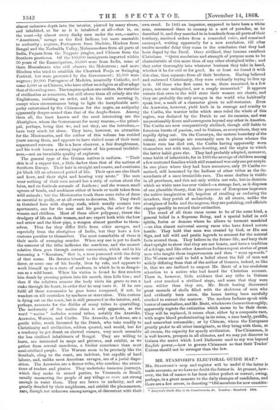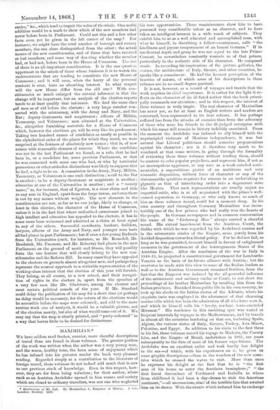MR. STANFORD'S ELECT ORAL GUIDE MAP.*
MR. STANFORD'S map and register will be useful if the latter is made accurate, as we have no doubt the former is. At present, how- ever, the list of names is far from either perfect or correct, owing, perhaps, in a great measure to the daily changes of candidates, and there are a few errors, in denoting "Old members for new constitu-
• Stanford's Guide Atop to The amstituencta, .1-c. London : Stanford. 1868.
encies," &c., which tend to impair the value of the whole. One useful addition would be a mark to show which of the new members had never before been in Parliament. Could not this and a few other facts even yet be given in the left corner of the map ? For instance, we might have the total number of borough and county members, the one class distinguished from the other ; the actual names of the new constituencies, and of those that have received or lost members, and some way of denoting whether the member had, or had not, before been in the House of Commons. The last of these is an all-important consideration. It is the one question uppermost in the minds of those whose business it is to watch the undercurrents that are tending to constitute the new House of Commons ; and it will soon, when the hurry of the personal contests is over, have an absorbing interest. In what respect will the new House differ from the old one ? With con- stituencies so much enlarged the natural inference is that the change will be important, but an analysis of the election reports tends to at least qualify that inference. We find the same class • of men as of old before the electors ; a very large number con- nected with the aristocracy, with the Army and Navy, and the Bar ; deputy-lieutenants and magistrates ; officers of Militia, Yeomanry, and Volunteers ; men educated at the Universities, &c., altogether furnishing materials for a House of Commons which, however the elections go, will be very like its predecessor. Taking two hundred names of candidates as nearly as possible in the alphabetical order of the places for which they stand, we were surprised at the fewness of absolutely new names ; that is, of new names with reasonable chances of success. Where the candidate was not in the last Parliament we found, as a rule, that he had been in, or a candidate for, some previous Parliament, or that he was connected with some one who had, or who by territorial possessions or other orthodox distinctions was likely to suppose that he had, a right to be so. A commission in the Army, Navy, Militia, Yeomanry, or Volunteers is one such distinction ; a call to the Bar is another ; to be a deputy-lieutenant or magistrate is another ; education at one of the Universities is another ; and a " county name," as, for instance, that of Egerton, is a clear claim and title to any seat in England, apart from the large towns, and even there is not by any means without weight. The new elements in the constituencies are not, as far as we can judge, likely to change, at least in this election, the character of the House of Commons, unless it is in the fact that where undoubted earnestness joined to high intellect and education has appealed to the electors, it has in some cases been welcomed and admitted as a claim at least equal to any of the others. Successful merchants, bankers, builders, lawyers, officers of the Army and Navy, and younger sons have all had places in past Parliaments ; but if even a few young Radicals from the Universities (such, for instance, as Mr. Roundell, Mr. Broderick, Mr. Freeman, and Mr. Roberts) find places in the new Parliament on the ground of merit and fitness, they will possibly form the one feature that will clearly belong to the new con- stituencies and the Reform Bill. In many cases they have appealed to the electors on grounds almost altogether new, and perhaps they represent the nearest approach to a veritable representation of the working-class interest that the election of this year will furnish. They belong, at all events, to a new school, and their recogni- tion of rights in the electors is, apart from the speeches of a very few men like Mr. Gladstone, among the clearest and most certain political sounds of the year. If Mr. Stanford could delay the publication of his map for a short time (or perhaps no delay would be necessary, for the return of the elections would be accessible before the maps were coloured), and add to the mere routine work one of analysis, it would be a valuable picture, not of the election merely, but also of what would come out of it. We may say that the map is clearly printed, and " party-coloured" in a way that leaves little to be desired for distinctness.



































 Previous page
Previous page